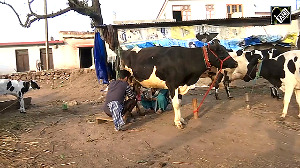Even as Indian Oil Corporation readies for a mega retail foray, the country's largest fuel retailer has already tasted success in its recently rolledout rural 'malls', dubbed Kisan Sewa Kendras.
The company, which recently appointed Technopak as consultant for its non-fuel retail foray, is selling not just petrol and diesel, but a whole range of commodities from fertilisers to seeds to fishing nets through the KSKs.
The government-owned Fortune 500 company, which is the country's largest company in terms of sales, has already commissioned 1,180 Kisan Sewa Kendras. It plans to open 1,000 more such kendras in the current financial year.
"The Kisan Sewa Kendras are the first steps towards the organised retail. The Kendras are being set up as small 'malls', where a farmer can buy whatever he needs. We are looking at maximising our non-fuel retail and the Kendras are a way towards that," said a senior IOC official.
Kisan Sewa Kendras are typically low-cost and are being set up by IOC on a dealership basis. The dealer operates the outlet and earns a margin on the sale of petrol and diesel. The margins on fuel sales at the Kendras are similar to what petrol pump dealers earn - Rs 1.03 per litre of petrol and 60 paise per litre of diesel.
The Kendras are set up in the dealer's land, who gets to pocket the entire revenue he earns from his non-fuel sales. The oil company may demand a share in the non-fuel sales at a later date, as has been done in the case of petrol pumps in urban areas, where a larger share of revenue has been demanded by the oil companies once the non-fuel retail picks up.
The rural retail market currently has four main players - ITC, DCM Shriram Consolidated, Godrej Agrovet and Triveni Engineering and Industries. ITC, for example, has around 15 stores with a turnover of around Rs 3-10 crore per year from a single store, while DSCL has a per store turnover of Rs 5-6 crore per year.
The typical investment in a Kisan Sewa Kendra is Rs 4-5 lakh, while the investment in a large petrol pump in an urban area is Rs 1-1.5 crore.
"We provide infrastructure such as pumps and the sales building, besides tying up with, for example, fertiliser and seed companies for their products to be sold through the Kendras," the IOC official said.
The minimum fuel sales required to set up a Kisan Sewa Kendra is 30 kilo litre (kl) per month. The average fuel sales per Kendra is 50 kl per month. This sale volume is pretty impressive, given that the all-India average throughput per outlet per month is about 70 kl.
"Some Kendras are, in fact, selling as much as 200 kl per month, which is very impressive in rural areas," the official said.
Besides selling commodities, the Kendras also conduct educational programmes which are aimed at giving farmers better insights into their field of work, for example agriculture.
For non-rural and non-fuel retail, the company is looking at two segments - highways and urban areas. IOC is planning to set up its own shopping centres and malls in these areas, but 'those plans will be finalised once Technopak has submitted all its reports', another IOC official said.
IOC already has convenience stores at its existing filling stations, but 'the idea now is to move further into promoting our own malls', the official said. The company, whose non-fuel sales are around Rs 100 crore at present, has set a target of Rs 3,000 crore from the segment in the current financial year.
The company's overall sales in the 2006-07 financial year was Rs 2,00,923.09 crore.







 © 2025
© 2025